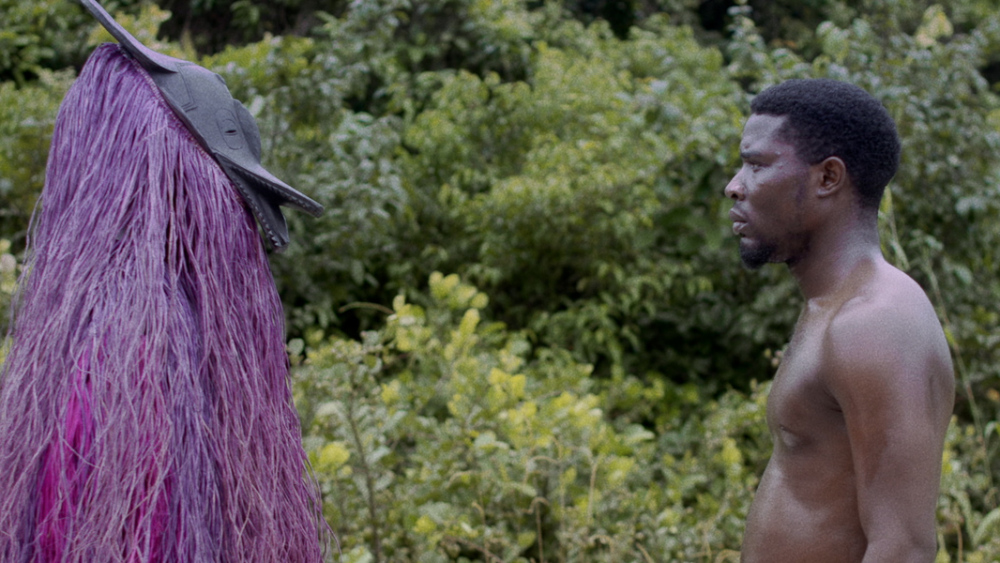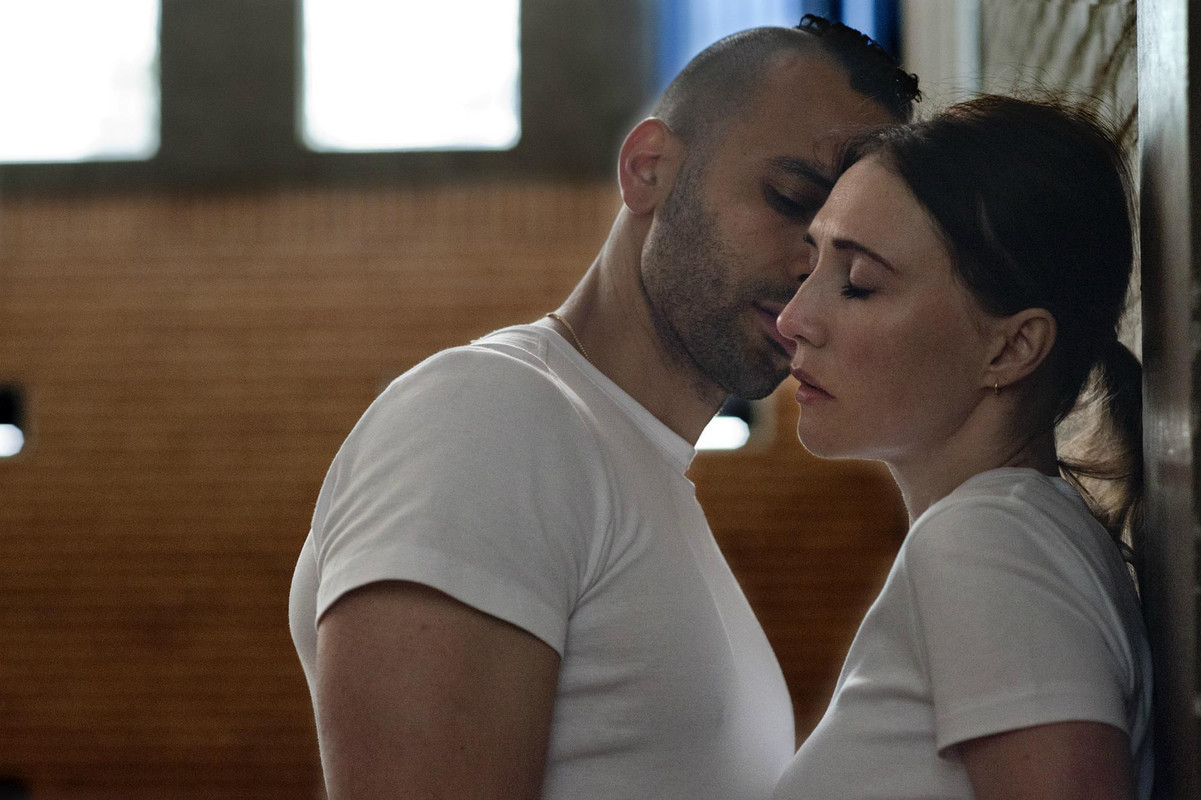The Lost Okoroshi
Dir: Abba Makama
Nigerian cinema, while I'm sure it is much more than this, has often been viewed as something of a punchline. Certainly, I’ve only come across it as clips of notably inept Nollywood films or satirical reviews of the legitimately bonkers sounding series of Vultures of Horror films. This all being the case, it’s refreshing to see a Nigerian film that is interesting for more than being crazy or terrible.
The Lost Okoroshi is a film that is obviously soaked in local tradition and culture. It’s about Raymond (Seun Ajayi), a security guard who wants to go back to tradition and become a farmer. He has a recurring dream of being chased by a masked spirit called Okoroshi. One day, Ray wakes up as the Okoroshi, he can no longer speak or remove the mask. Lost in the city, he is followed around by a kid who wants to be his promoter, then kidnapped by a group who want to use him as an icon to restore Nigeria’s traditional beliefs.
This seems like a deeply personal project and one that may have had to scrape together both funding and equipment. At times it is amateurish, with very rough sound recording and some poor acting (a journalist in the film’s final scene is the worst offender), but it’s clear that many of these issues, though they are a problem, stem more from a lack of resources than the filmmakers not being accomplished.
Things start slowly, with the first act composed of several long scenes of conversation that don’t really go anywhere and, at least for an international audience, aren’t terribly funny. The film picks up hugely once Raymond is transformed, and it builds comic momentum from there. Initially, co-writer/ director Abba Makama gets plenty of mileage purely from the incongruity of the Okoroshi figure walking through modern Lagos; a traditional figure set against a city that now speeds past him. There are plenty of funny moments here, especially when, his ‘promoter’ having collected a bag of money from people watching ‘Raymond’ dance, the Okoroshi hands the money to a hooker. The three of them form a sort of comedic chorus for a while, and again the film mines laughs from the sheer strangeness.
Later, when ‘Raymond’ is taken by the traditionalist group, the film continues to find better and funnier gags as it goes on. The group is clearly inspired by the scenes in The Life of Brian with the People’s Front of Judea and, while Makama and Africa Ukoh’s dialogue never reaches that sort of sublime comic inspiration, he hits on plenty of laughs. The film also looks pretty good, with the costumes for Okoroshi and the other ‘masquerades’ being especially striking.
For all the solid gags, Makama and Ukoh’s screenplay is patchy and disjointed. Beginnings and endings seem to test them, as storylines peter out and Makama simply cuts to the next scene rather than drawing to a satisfying close. This is also a problem with the film as a whole, which closes with several minutes of dry dialogue essentially recapping what we’ve just seen with a professor laying out events for a journalist and suggesting what Raymond’s case may mean for traditional Nigerian practices.
The Lost Okoroshi is seldom less than interesting, and the cultural aspects in particular will mark it out as something different for most UK audiences, but whatever the reasons for its technical amateurishness, that and the sometimes clunky screenplay mean that the several good laughs you’ll get from it never quite manage to paper over the cracks.
★★½
Instinct
Dir: Halina Reijn
Set in a rehabilitation centre for sexual offenders, Instinct sees Carice Van Houten as Nicoline, a therapist newly assigned to Idris (Marwan Kenzari, familiar from his role as Jafar in Disney’s live-action Aladdin). With most of the staff convinced he’s doing well, Idris is nearing the end of his time at the centre, Nicoline disagrees, but the dynamic between her and Idris is more than therapist/patient, as her manipulative charge perceives that she’s attracted to him.
The term ‘psychological thriller’ is one that has been misapplied through the years, often used as an umbrella term for horror films their makers don’t want lumped in with the Friday the 13ths of the world. Instinct is a true psychological thriller, with all its tension coming from the dynamics and interaction between Nicoline and Idris. On these terms, it often works well. Carice Van Houten delivers her most notable and best performance for some time. Working again in her native language, she delivers a natural and nuanced performance that finds many layers in her character. Kenzari may be even better, always compelling and frightening as he walks the character of Idris along a precarious line between being charming and very obviously dangerous. Watching these two play off each other is often thrilling in itself, as there is palpable chemistry between them which, given the situation and the characters, is always disturbing.
When Instinct is purely about performance, it can be excellent. This is never more true than in a sex scene between Nicoline and Alex (Pieter Embrechts) who is the basketball coach at the centre. We’ve seen this scene a hundred times, where one of the participants in a sex scene clearly wants it to be with someone else. Many directors would handle this by showing Idris, either in cuts or by having him, at a certain point, replace Alex in the scene. Reijn doesn’t do this, instead trusting us to understand the dynamic through Van Houten’s performance. Her trust in her lead’s skill pays off; the scene is unsettling and complex without simply stating what we’re supposed to read into it. It’s surprising, then, that the direction is increasingly the film's downfall.
The signs are there in the first half, notably in several confused scenes with Nicoline’s mother (Betty Schuurman) which seem to me to accidentally leave it very unclear whether that character is alive in the world of the film. Their first scene, in particular, is almost dreamlike - a quality which, if she’s reaching for it, Reijn never pulls off here. Much of the rest of the first half of the film is solidly grounded (though the fact the rest of the staff can’t see through Idris as easily as Nicoline does strains credulity), and benefits from the excellent central performances, but the film begins to go off the rails once the chemistry between Nicoline and Idris goes beyond an unsettling background simmer.
During a scene when they are alone on the centre’s basketball court, there is an encounter between Idris and Nicoline. Most of the scene is visually muted, but at a certain point the lighting shifts, becoming brighter and more intense. This carries over into the following scenes for about ten minutes. I suspect Reijn would say that this is to suggest that Nicoline is feeling a brighter light on her, a more intense focus. What comes across instead is, again, an uncertainty that I’m sure is unintentional, as to whether we should accept these scenes as reality or see them as something Nicoline is imagining. This also carries over into a scene at the beach, which marks the first moment that the film broke my suspension of disbelief.
The third act increasingly feels less like Reijn is telling her story than advancing an idea about the way people can be attracted to dangerous relationships. This might have worked had she more decisively gone for this approach early on, but next to the very grounded scenes of the first half, it’s an uneasy fit. The scenes themselves aren’t bad - one in which Idris turns up at Nicoline’s flat is interesting in how it tries to boil down an entire abusive relationship into five minutes, but it always feels more like an exercise than something we can believe in the context of these characters and their story.
Halina Reijn shows skill as an actor’s director. This is no surprise, given that she is best known as an actress (in the UK she is most recognised for a supporting role in Paul Verhoeven's Black Book, alongside Van Houten), but her visual and thematic approach is too scattershot for her ideas to engage as they should. The two central performances are too good for Instinct to be a total loss, but the confused direction and screenplay mean that they stand out as far better than the film they appear in.
★★½



No comments:
Post a Comment